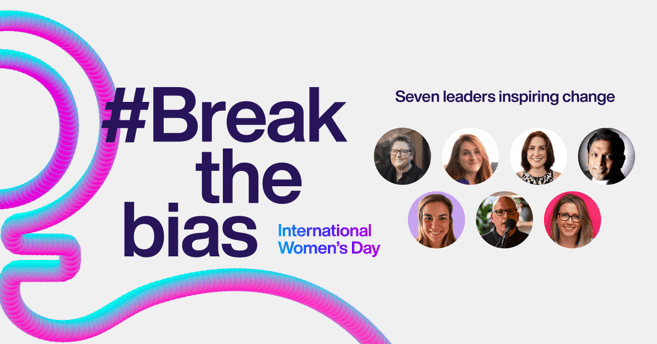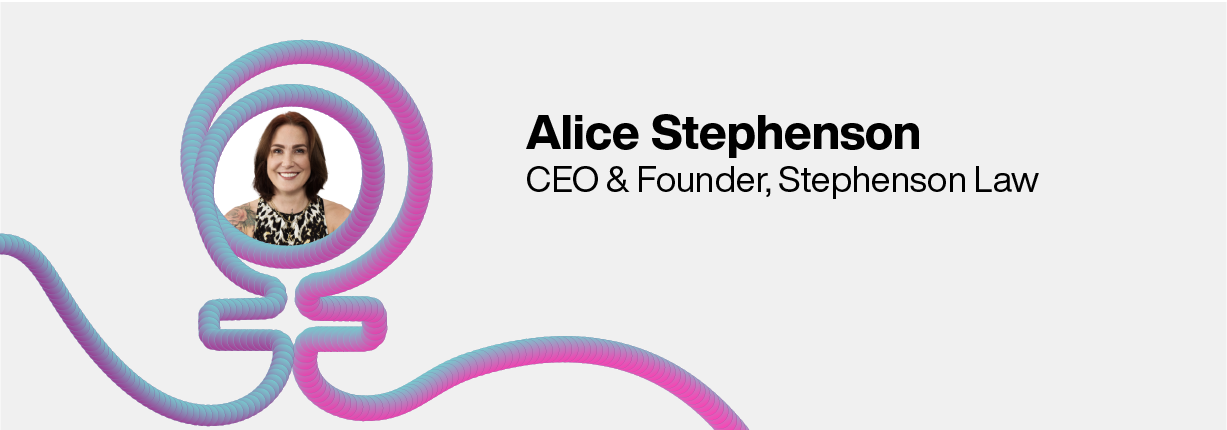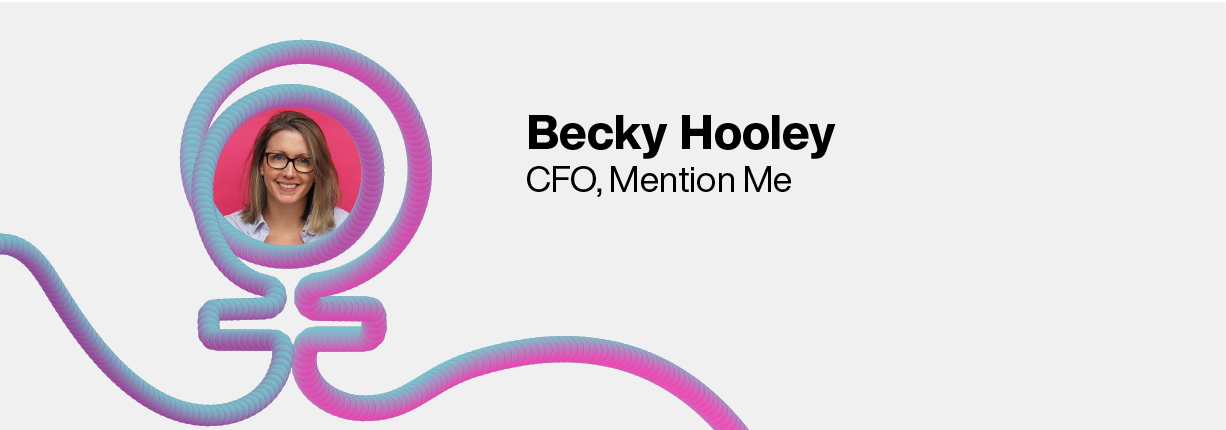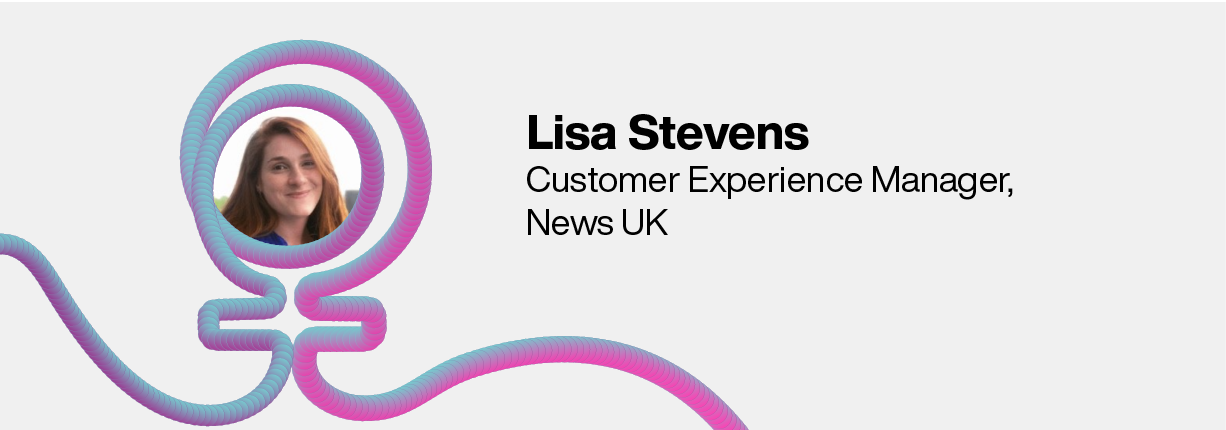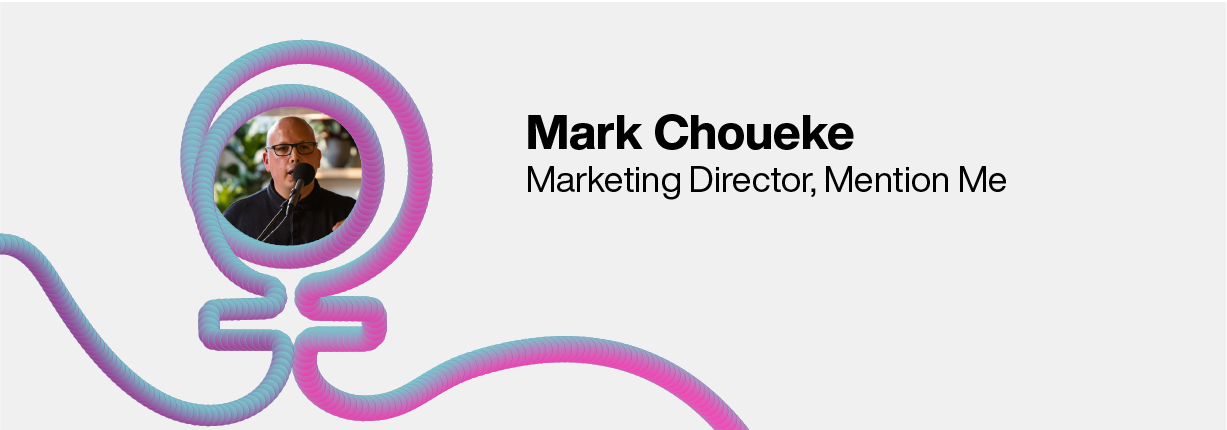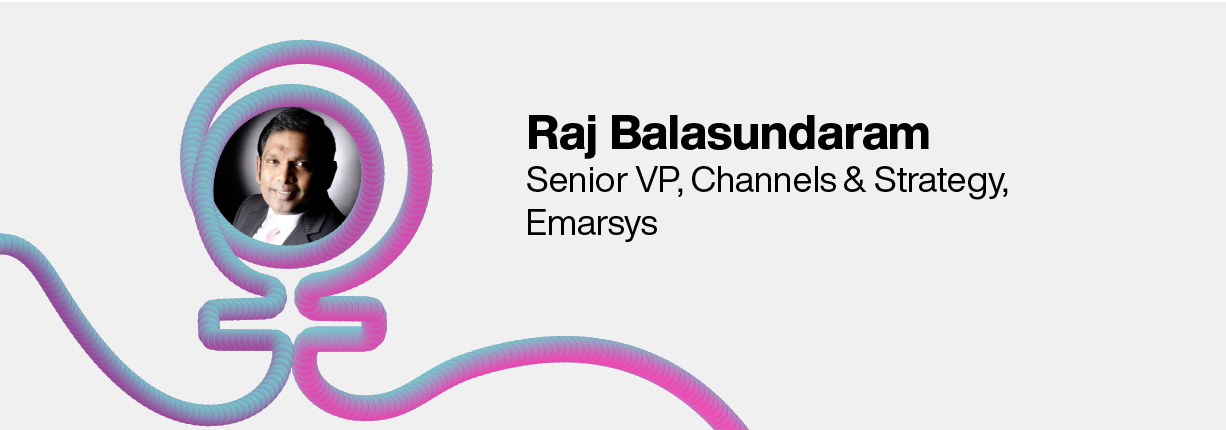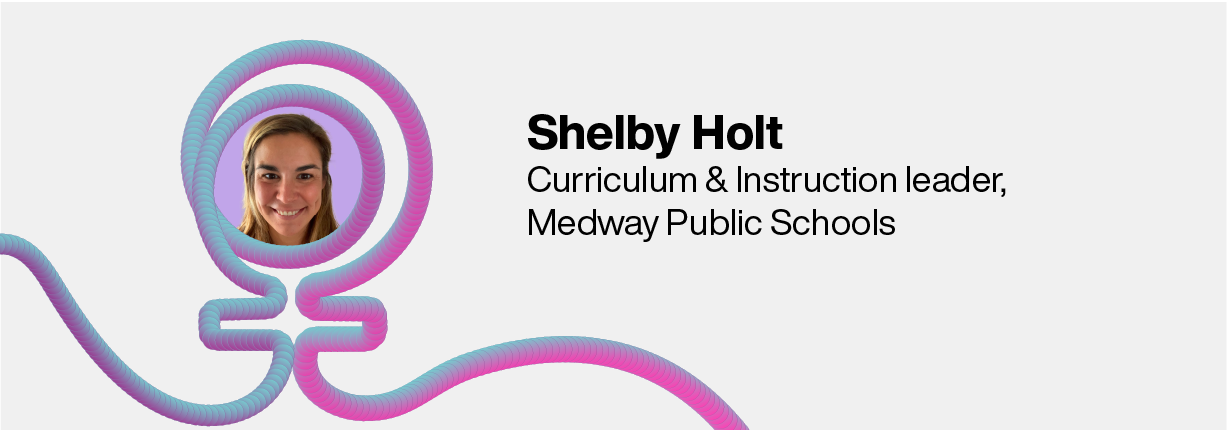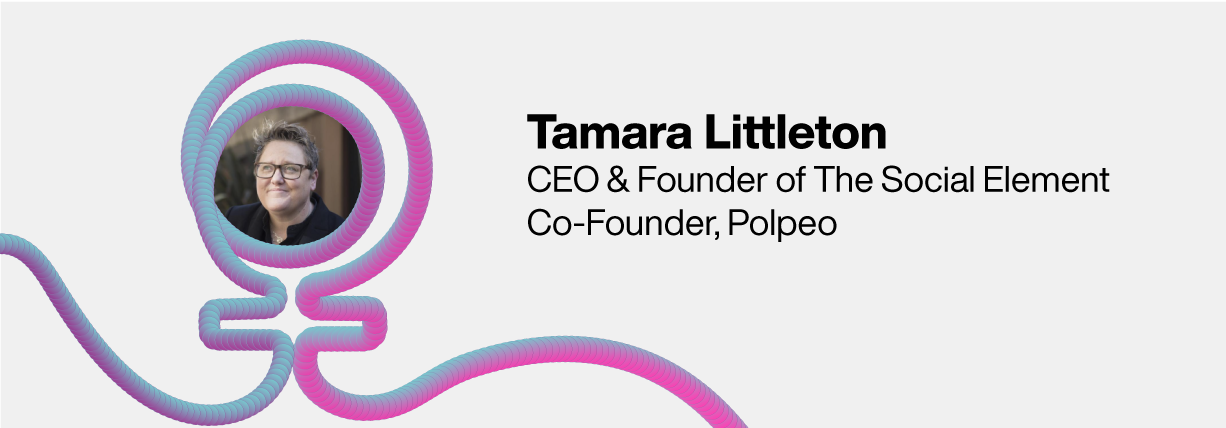International Women's Day 2022: 7 leaders striving to #BreakTheBias
Read time: 12 mins
- Alice Stephenson, CEO & Founder, Stephenson Law
- Becky Hooley, CFO at Mention Me
- Lisa Stevens, Customer Experience Manager at News UK
- Mark Choueke, Marketing Director at Mention Me
- Raj Balasundaram, Senior VP, Channels & Strategy, Emarsys
- Shelby Holt, Curriculum & Instruction Leader, Medway Public Schools
- Tamara Littleton, CEO & Founder of The Social Element, Co-Founder of Polpeo
Alice Stephenson, CEO & Founder, Stephenson Law
Before founding Stephenson Law, Alice Stephenson had come precariously close to leaving the sector altogether. “I couldn’t see myself having a long-term career in a traditional, male-dominated law firm,” she says. “I found it suffocating.”
Fortunately, the encouragement of a “massively supportive” female colleague spurred Alice on – and she was determined her firm would defy the conventional norms.
“I wanted to create a place where people like me enjoyed working.” For Alice, this has meant fostering an environment where employees feel free to express themselves – be that through bold appearances (Alice herself sports colourful tattoos and pink hair), or flexible working styles. So what is brand advocacy, which involves promoting the firm's values and building strong relationships with clients and stakeholders, is also a crucial aspect for Alice.
Flexibility is something Alice believes is particularly important when it comes to working mothers. Having had her first child at 18, she’s acutely aware of the prejudices and challenges that can bring.
“Early on in my career, it was considered unprofessional to have any crossover between your children and your work. I’d often hear stories of female colleagues shutting themselves away on days off so clients wouldn’t hear their children in the background.”
But, with Alice’s help, things are looking up. She regularly shares empowering content to her more than 52,000 followers on LinkedIn, breaking down conventional barriers and inspiring others to follow suit. “There are a lot more people like me starting their own businesses, and that’s driving change. I’ve got a great network of female founders in law, and we really support one another. Employers have to start paying attention or they’ll lose out on talented people.”
When it comes to enacting social change more widely, Alice firmly believes it starts with looking in the mirror. “Challenge your beliefs and open your mind to new perspectives. Have that curiosity to think a bit further, and try to understand somebody else’s point of view. That’s what will really start to make a difference.”
Becky Hooley, CFO at Mention Me
As Mention Me’s CFO, Becky Hooley is striving to see more equality in leadership teams. “You need the right representation around the table to set the culture. It’s about creating forums and arenas where women can raise concerns in confidence, without judgement.”
Despite witnessing progress for women in the workplace throughout her career, one bias that Becky herself has encountered is that faced by new mothers. “When you’ve just come back from having a baby, people assume you’ve changed”, she says. “Of course, everybody changes after they have a child, but that doesn’t mean you’re not as professionally capable as you were before.”
But Becky believes attitudes are shifting as we settle into the new era of hybrid working, which gives mothers more freedom to balance productivity alongside parenting. “While I’m very pro-flexible working, it must be driven by the individual — it shouldn’t be driven by assumptions about what that individual might need.”
As a mother to a young child, Becky is embracing the new working landscape with open arms. “In a pre-Covid world, I’d never have felt empowered to demand flexible working. Now I wouldn’t even hesitate, and it will be non-negotiable in any of my future roles.”
With employers becoming open to the concept of hybrid working, Becky hopes this is the start of wider discussions among leadership teams about how working life can be better suited to women. “High-profile people are talking about women’s needs. I spent the last three years in America, where maternity benefits are just horrendous, and a lot of people are speaking out about that now. That then encourages more people to speak out, so you get a snowball effect”.
As a woman in leadership, Becky feels positive about the future. “There’s still a lot to do, but I think we must also celebrate the success women are having and use that to empower further change.“
Lisa Stevens, Customer Experience Manager at News UK
It was in 2014, while working at BBC Worldwide, that Lisa Stevens first felt inspired to positively change culture around women in the workplace. “Two awesome female consultants did a session on leaning in as a woman at work,” she recalls. “I felt the organisation had a gap in developing people in that respect, so I messaged our Director of People. She gave me the go ahead to set up a group to solve that.”
And so W&MEN@WORLDWIDE was born. Open to both men and women – “for a women’s role to change, a man’s role also needs to change” – Lisa spearheaded activities such as quarterly events with inspirational speakers, a mentorship scheme and a steering group, all focussed on creating a more inclusive culture. She went on to advise on similar activities when she left BBC Worldwide for FreeSat, taking on a role in the DE&I group alongside her full-time position as a Customer Experience Manager.
Though beneficial for a lot of people, Lisa admits taking on these extra responsibilities doesn’t come without its challenges. “It's very empowering to drive change, but it can be another full-time job on top of your existing role, which may not be sustainable. That’s all too often the case in organisations without a formal structure and investment. If you seriously want to drive a culture shift, it has to come from the top and be baked into the infrastructure of how your company runs. That can mean everything from having dedicated ED&I roles, to incorporating it into how you measure and reward your people.”
On a day-to-day basis, Lisa believes it’s allyship that can make the biggest difference in breaking the bias. “Everyone and anyone can do it, it doesn’t matter who you are,” she says. “Awareness is the first step to generate change, then it’s about speaking out and owning it. If you see or hear something that doesn’t feel right, challenge that behaviour. Be the change you want to see.”
Mark Choueke, Marketing Director at Mention Me
As the Marketing Director, Mark regularly champions his colleagues at Mention Me, both male and female. I’ve seen first-hand how he advocates for women, ensuring they get company-wide recognition for their work. While providing constructive feedback to help his female teammates progress in their careers, Mark also nurtures a safe and uplifting environment to make them feel supported in both their professional and personal lives.
To help break the bias in the workplace, Mark believes listening to his female colleagues’ experiences is key. It’s through this he’s identified two clear examples of bias in the workplace during his career. “One is maternity. Women I’ve worked with have at times appeared to feel forced to decide between being a mum or a full-time worker, because there’s an assumption they can’t embrace both.”
“There’s also still an enormous amount of casual misogyny”, Mark says. “I wonder if any of our unconscious biases mean we can’t see it for what it is. But things I’ve heard, when women have chosen to tell me after the fact, are absolutely outrageous.”
When it comes to driving long-term structural change and creating a culture where conversations about women’s issues are as important as those about revenue, Mark says more than talk is needed. “We need to be clear about what we’re asking. Representation of women in management teams is improving, but representation on many leadership teams and boards is still quite poor.
“There’s still some way to go in closing gender pay gaps in every industry too. I think businesses are ripe for a much bolder and more open conversation on that.”
But it’s clear progress is being made. “I’m proud to work at a company that is driving these conversations both internally and externally”, Mark says. “We’re not perfect yet, but the appetite for improvement I’ve seen in the last year is very encouraging.” And as more men like Mark get involved with discussions about how to empower women in the workplace, we can all continue accelerating this change.
Raj Balasundaram, Senior VP, Channels & Strategy at Emarsys
Teachers and mentors guided TED speaker Raj Balasundaram to where he is today – and now he’s forwarding on the good deed. “Others have given to me, and now I’m giving back,” he says. “You can have a lot of talent, but sometimes it needs polishing in the right way to shine.”
For Raj, that means helping young adults discover their passions. “People often think they want to pursue a career like mine, but I challenge them on if it’s what they really want to do, or what society wants.”
It’s a concept Raj is familiar with first-hand, having grown up in India where fulfilling conventional ideas of success – good income, good job – came above all else. Closer to home though, Raj challenges those who might imagine a traditional patriarchal family.
“India is seen as a male-dominated society, but it’s the women pulling the strings,” says Raj. “I grew up in a very matriarchal household.”
So it came as a surprise when, during his time in Europe, Raj realised there was gender inequality at work. “I couldn’t unsee it,” he remembers. “I started asking my female relatives and friends about their experiences, and every one said they’d encountered negative bias at work.”
Perhaps that explains why Raj believes International Women’s Day is so important for building awareness. “It’s not until you create that awareness that people start investigating it for themselves and realise there’s still work to be done.”
When asked about the woman that most inspires him, Raj doesn’t hesitate. “My mum,” he says. “She’s an amazing inspiration. As well as giving me and my sister opportunities she never had, she received the President’s Award in India for her work with underprivileged children. To this day, she continues to guide so many people.”
But before you go about measuring the success of your contributions to International Women’s Day this year, bear Raj’s words in mind: “Don't let society tell you what success is. Don't let society tell you that you have to be a billionaire to be successful, or go on a rocket. Unless, that is, you really want to.”
Shelby Holt, Curriculum & Instruction leader, Medway Public Schools
With a 15-year career spanning education systems in both the UK and US, Shelby Holt knows a thing or two about instilling an inclusive approach from a young age. Responsible for early childhood public schools in the Massachusetts town of Medway, she sees her role similar to performing brain surgery.
“The brain is so malleable from birth to seven years old,” she says. “What we do every minute matters. It can literally change the neural pathways of a child’s brain. It’s incredible.”
When it comes to breaking the bias in the classroom, Shelby believes high expectations combined with high support is key. It’s a balance that varies for every individual, but getting the two right is crucial, whether that’s for a child or their teacher. “I’m continually raising the bar of where we can go and what we can achieve.”
While Shelby no doubt inspires the children whose education she advises on, this inspiration goes both ways. She’s inspired by the little girls who bring their full selves to the classroom – citing a particular student who’s constantly active in lessons – and the educators who create the space for this to happen. “I’m inspired by every woman who shows up and is really themselves everyday,” she says.
These women will likely cross her mind when pausing on International Women’s Day to reflect on the importance of women lifting one another up. “There are so many pressures in day-to-day life, it’s vital to think about how far we’ve come and how we can empower each other, as women in the workplace and beyond.”
That includes having more authentic conversations about how women want to be with each other. “Next time you’re in a group of all women, look around,” says Shelby. “Is there a group being silenced? Is it the frazzled mothers? The carers? We need to create the space for every voice to be heard. That’s when the difficult conversations can happen.”
With Shelby at the helm of Medway’s early childhood schools, you can feel confident that this space will only keep getting bigger.
Tamara Littleton, CEO & Founder of The Social Element, Co-Founder of Polpeo
“I see it as my purpose to speak up as a gay female CEO as it encourages others. Diversity and inclusion is something I’m super passionate about.” When it comes to fitting the mould of an agency CEO, Tamara Littleton breaks it in more ways than one. Yet that hasn’t stopped her carving a career trajectory that includes being named CEO of the Year by The Drum and a profile piece in The Times.
Encouragingly, she’s never seen her gender or sexuality as blocking her progress – although the barrier she was forced to overcome earlier on in her career is one many women can relate to.
“I lacked self-belief,” she says. “I constantly had imposter syndrome and thought I couldn't do it.”
This self-doubt came to a head when Tamara was invited to do a TED talk in 2017. “I said yes, then immediately thought ‘what the hell have I done?’,” she remembers. “I almost backed out three times. Then I did it and loved every second.”
Now the founder of not one but two companies, Tamara is dedicated to creating truly diverse and inclusive workplace cultures. Her longest-running agency, The Social Element, employs an all-female leadership team, as well as people from a range of ethnic backgrounds, and those with disabilities.
“I’m a big fan of normalising things by talking about them,” she says. “I don't want any topic to have a stigma.”
For The Social Element, that’s included discussing the menopause and personal pronouns, as well as setting up internal steering groups centred on working parents, people of colour and those who identify as part of the LGBTQ+ community. “I’m constantly trying to educate myself,” says Tamara. “You have to assume you’ll never be perfect and strive for better.”
A big part of The Social Element’s inclusive culture also comes from its remote-first model, which “literally provides a global talent pool to recruit from”.
Tamara’s biggest piece of advice for women aspiring to follow in her footsteps? “Believe in yourself. Dare to think bigger and learn from your mistakes along the way. After all, what’s the worst that can happen?”
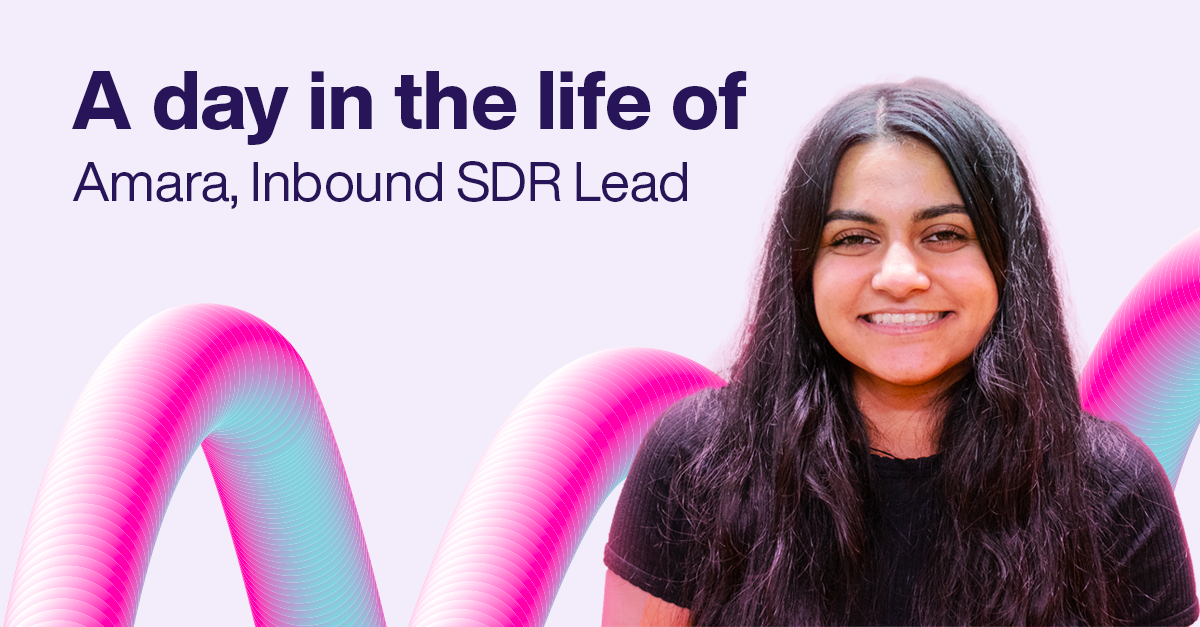
Never miss another update
Subscribe to our blog and get monthly emails packed full of the latest marketing trends and tips


